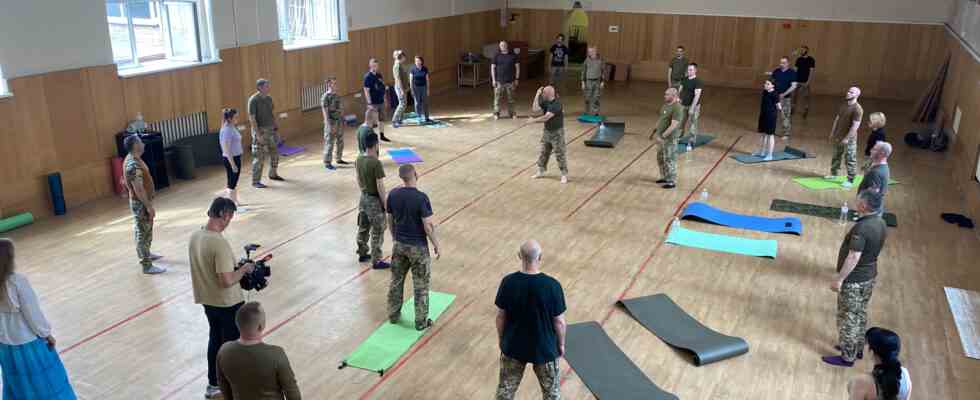report
Status: 07/13/2022 06:36 a.m
War traumatized – often for life. Ukraine is therefore focusing on prevention for its armed forces. She trains experts in dealing with war experiences – and in the right reaction to stress.
At first glance, it looks like a meditation course at an adult education center. Around 20 men and women are sitting cross-legged on sleeping mats in a large hall at the Taras Shevchenko University in Kyiv, their arms resting on their knees, their palms turned upwards. But this is not about coping with stress in everyday life, but about survival.
“A lot can happen when there is stress at the front. People’s behavior is then often changed. They feel blocked, panic, are aggressive or hysterical,” explains coach Rodion. “Here we learn how to help these comrades to save their lives.”
Because if someone doesn’t seek cover in time or isn’t able to make the right decision, it can quickly become dangerous, he says.
“I was devastated at the time”
Rodion works for the Territorial Defense of Ukraine – an army organization consisting of reservists and volunteers. He already lent a hand in the embattled Donbass in 2014 to help supply the troops.
“I’m not just reporting what I saw here, but also what I felt. But I’m not just talking about myself, I’m also talking about others. About what they experienced,” he says. “In a trusting atmosphere, we look at the specific cases and their conditions – and how the comrades managed the situation.”
Everyone who is here at the five-day course will later be sent to the various army battalions at the front. To pass on their knowledge there – because there are already many volunteers who have no major military knowledge.
This makes resilience training all the more important, says one of the course participants, who introduces himself as “Eugene”. He too has experienced shelling and bombing, the force of which has also shaken him inside:
I was devastated then. At a certain point I didn’t care if anything happened to me. If I had known the techniques that learn like here, I would have been better able to handle it.
Number of PTSD patients is increasing
“Just to say, ‘Yes, I’m scared!’ can help,” says a trainer to the group. It’s about opening up and allowing feelings to take pressure off your soul.
Jevgeny agrees. He is a psychiatrist at the Kyiv State Railways Clinic. Allowing feelings is something in the army, he says. The motto is often different: “You should be strong, don’t cry, don’t show any feelings, don’t worry about your feelings! But it’s more true: the more you fight it, the more you have to pay for it with your health.”
Topic overview
war in Ukraine
Jevgeny knows what he’s talking about. Since the beginning of the war in the spring, the number of his patients has risen significantly, he reports, and his psychiatric clinic is now already 70 percent full. Among the patients are many soldiers with a diagnosis of post-traumatic stress disorder, or PTSD for short. The psychiatrist is certain: the longer this war lasts, the more cases there will be.
This is also the reason why Natalia takes part in the army’s prevention course. The military psychologist suspects that the country is facing a huge problem. And that she would do well to refresh her knowledge:
“Of course nobody was prepared for this war. You can’t compare what happened before in Donbass with what’s going on there now,” she says. “There will be a lot of people who have PTSD. I’d like to know more about it because we have a lot of work to do.”

